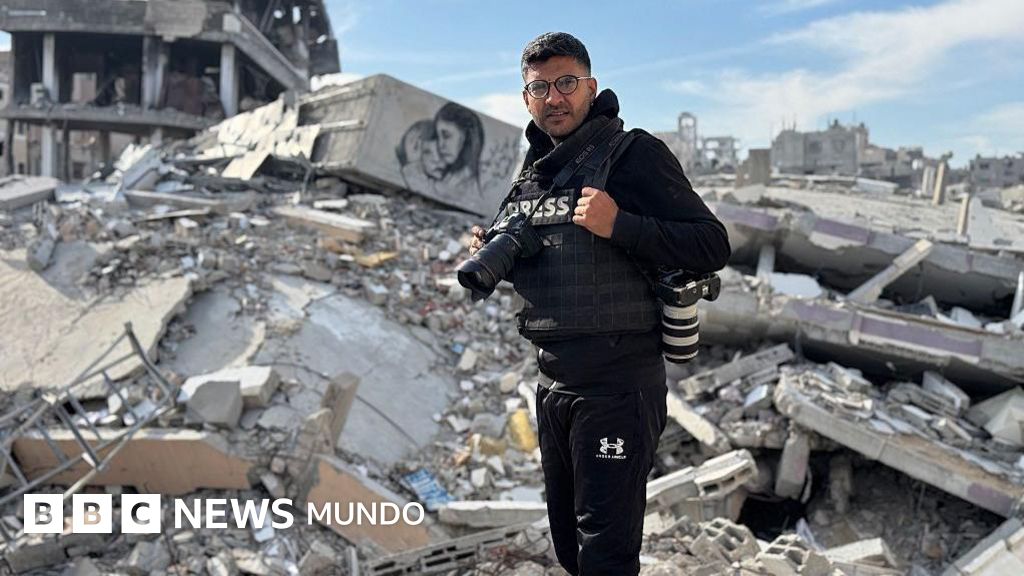

Image source, AFP
-
- Author, Writing
- Author's title, BBC News World
Bashar Taleb portrayed the impact of the Israeli offensive on the Gaza Strip until hunger reached it.
On Saturday, July 19, the Palestinian photojournalist published a message on his Facebook account that said: “I no longer have the strength to work in the media. I am thin and I can no longer work.”
Taleb, 30, has photographed the victims of hunger and violence in Gaza for the International News Agency France-Presse (AFP), whose journalists published a statement on Monday, July 21 in which they warned that if there is no “immediate intervention, the last reporters in Gaza will die.”
“From the AFP Foundation in August 1944, we have lost conflict journalists, we have had injuries and prisoners in our ranks, but none of us remembers seeing a partner starving,” says the statement of the Society of Journalists of the French News Agency.
This call is inserted into a global alert. Two days later, on Wednesday, July 23, more than 100 humanitarian organizations, which include Save the Children, Oxfam and doctors without borders, published a statement in which they denounce a “mass famine” in Gaza.
However, Israeli authorities argue that they are facilitating the entry of humanitarian aid and that they act according to international law.
A brother who died of hunger

Image source, Bashar Taleb / AFP
Taleb works for AFP since 2010. He has been a collaborator, independent photographer and, since 2024, main photographer.
“He has lived in the most absolute homelessness and works with a huge risk for his life,” warns the statement of AFP journalists.
“Hygiene is an important problem for him, with periods of serious intestinal diseases.”
His colleagues denounced that the Palestinian photographer “lives since February in the ruins of his house in the city of Gaza with his mother, his four brothers and the family of one of them.”
“His house lacks any comfort, except for some cushions. On Sunday morning, he informed that his older brother 'had died of hunger.”
“We refuse to see them die”

Image source, Bashar Taleb / AFP
The journalists explained that while Taleb and other collaborators receive a monthly AFP salary, “there is nothing to buy, or prices are completely exorbitant.”
“The banking system has disappeared and those who change money between online and cash accounts charge a commission of almost 40%.”
“We refuse to see them die,” adds the note regarding collaborators. “We risk finding out about their deaths at any time and this is unbearable.”
The agency's employees specified that Taleb, along with some other colleagues, are the only ones who report on what happens in the Gaza Strip.
“The international press has prohibited entry into the territory for almost two years.”
On Sunday, July 20, Taleb wrote: “For the first time, I feel defeated.”
“I hope Mr. Macron could help me get out of this hell,” he said in reference to the French president.
“I don't know if I will come back alive”

Image source, Bashar Taleb / AFP
The statement of the company of AFP journalists also tells the story of Ahlam, another collaborator who lives in the south of the Gaza Strip.
“Every time I leave the store to cover an event, conduct an interview or document a news, I don't know if I will come back alive,” the statement warns.
Alham ensures that the biggest problem is the lack of food and water.
“We see how their situation worsens. They are young and their forces are failing them. Most no longer have the physical capacity to move through the enclave and perform their work.”
“His heartbreaking screams of relief are now daily.”
“Will I eat today?”

Image source, Bashar Taleb / AFP
Like AFP journalists, humanitarian aid organizations that gave the alert about the famine in Gaza emphasized the consequences that the conflict is carrying their workers.
“While the mass famine extends by Gaza, the body of our colleagues and those we serve is consumed,” says the document.
“Every morning, the same question resonates in Gaza: will I eat today?”
“Children tell their parents that they want to go to heaven, because at least in heaven there is food,” said a humanitarian worker who provides psychosocial support when talking about the devastating impact on children.
“The Palestinians are trapped in a vicious circle of hope and anguish, waiting for assistance and fire -to -fire, just to discover that the conditions get worse,” says the statement.
“It is not just a physical, but also psychological torment. They are presented with survival as a mirage.”
International pressure

Image source, Bashar Taleb / AFP
The UN declared that the Israeli forces killed more than 1,000 Palestinians who tried to obtain food aid since the Gaza Humanitarian Foundation, a controversial entity backed by the United States and Israel, began operations at the end of May in replacement of a broad humanitarian response coordinated by the UN.
Israel faces a growing international pressure due to the catastrophic humanitarian situation in the Palestinian territory.
More than two million people suffer from a serious shortage of food and other essential products for subsistence after 21 months of the current Israeli offensive.
The organizations letter indicates that the distributions allowed for help in Gaza “have an average of only 28 trucks per day.”
The UN has previously suggested that a minimum of 600 daily trucks be required to feed a population of two million people.
Organizations claim that Israel has denied access of “tons” of crucial supplies and accuse him of false promises about his plans to increase help “when there is no real change on the ground.”
On Tuesday, the Israeli military agency responsible for coordinating help deliveries, Cogat, insisted that Israel acts in accordance with international law, and said it facilitates the entry of aid, while ensuring that it does not reach Hamas.
The Israeli military spokesman, Lieutenant Colonel Nada Shoshani, published in X that 950 aid trucks “currently wait in Gaza for international organizations to collect and distribute the civilian population Gazatí.”
“This happens after Israel facilitated the entry of Gaza aid,” he added.
The victims

Image source, Bashar Taleb / AFP
According to the UN, approximately 87.8% of the Gaza Strip is now under Israeli evacuation orders or is within Israeli militarized areas, which leaves the 2.1 million inhabitants overwhelmed in about 46 km² of territory.
Israel launched a military campaign in Gaza in response to the cross -border attack of Hamas of October 7, 2023 that some 1,200 people died and another 251 were taken as hostages, according to Israeli authorities.
Since then, at least 59,029 people have died in Israeli attacks, including more than 17,000 children, and 142,000 people have been injured, according to the Ministry of Health of Gaza, controlled by Hamas.

Subscribe here To our new newsletter to receive every Friday a selection of our best content of the week.
And remember that you can receive notifications in our app. Download the latest version and act.





